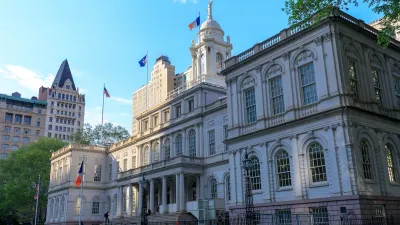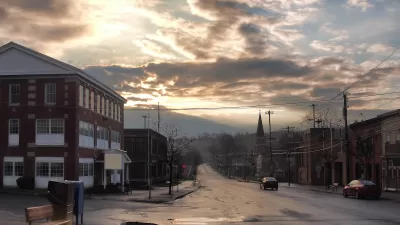Mayors from big cities are feeling shortchanged by the federal government, which they say is disproportionately handing out stimulus money to small and rural areas.
The U.S. Conference of Mayors recently released a report that blasts the federal government's disbursal of stimulus funding. The report argues that big cities aren't getting their fair share of the money.
"The mayors commissioned a report looking at a pot of $18 billion set aside for transportation. When the report was released this month, the 85 most populous metropolitan areas had received $8.8 billion -- or 48% of the total. Yet those same areas account for 63% of the U.S. population and 73% of the gross domestic product, the report said.
Chicago would need to get another $250 million in stimulus transportation funds to reach a level that reflects its contribution to the Illinois economy, the report calculated. In Ohio, Cleveland and Cincinnati account for 40% of the total economy yet received less than 5% of the transportation stimulus funds earmarked for the state."
FULL STORY: Mayors complain about stimulus spending

Manufactured Crisis: Losing the Nation’s Largest Source of Unsubsidized Affordable Housing
Manufactured housing communities have long been an affordable housing option for millions of people living in the U.S., but that affordability is disappearing rapidly. How did we get here?

Americans May Be Stuck — But Why?
Americans are moving a lot less than they once did, and that is a problem. While Yoni Applebaum, in his highly-publicized article Stuck, gets the reasons badly wrong, it's still important to ask: why are we moving so much less than before?

Using Old Oil and Gas Wells for Green Energy Storage
Penn State researchers have found that repurposing abandoned oil and gas wells for geothermal-assisted compressed-air energy storage can boost efficiency, reduce environmental risks, and support clean energy and job transitions.

Updating LA’s Tree Rules Could Bring More Shade to Underserved Neighborhoods
A new USC study finds that relaxing Los Angeles’ outdated tree planting guidelines could significantly expand urban tree canopy and reduce shade disparities in lower-income neighborhoods, though infrastructure investments are also needed.

California's Canal Solar Projects Aim to Conserve Resources and Expand Clean Energy
California’s Project Nexus has begun generating electricity from solar panels installed over irrigation canals, with researchers and state agencies exploring statewide expansion to conserve water and boost clean energy production.

HHS Staff Cuts Gut Energy Assistance Program
The full staff of a federal program that distributes heating and cooling assistance for low-income families was laid off, jeopardizing the program’s operations.
Urban Design for Planners 1: Software Tools
This six-course series explores essential urban design concepts using open source software and equips planners with the tools they need to participate fully in the urban design process.
Planning for Universal Design
Learn the tools for implementing Universal Design in planning regulations.
Heyer Gruel & Associates PA
City of Moreno Valley
Institute for Housing and Urban Development Studies (IHS)
City of Grandview
Harvard GSD Executive Education
Salt Lake City
NYU Wagner Graduate School of Public Service
City of Cambridge, Maryland





























